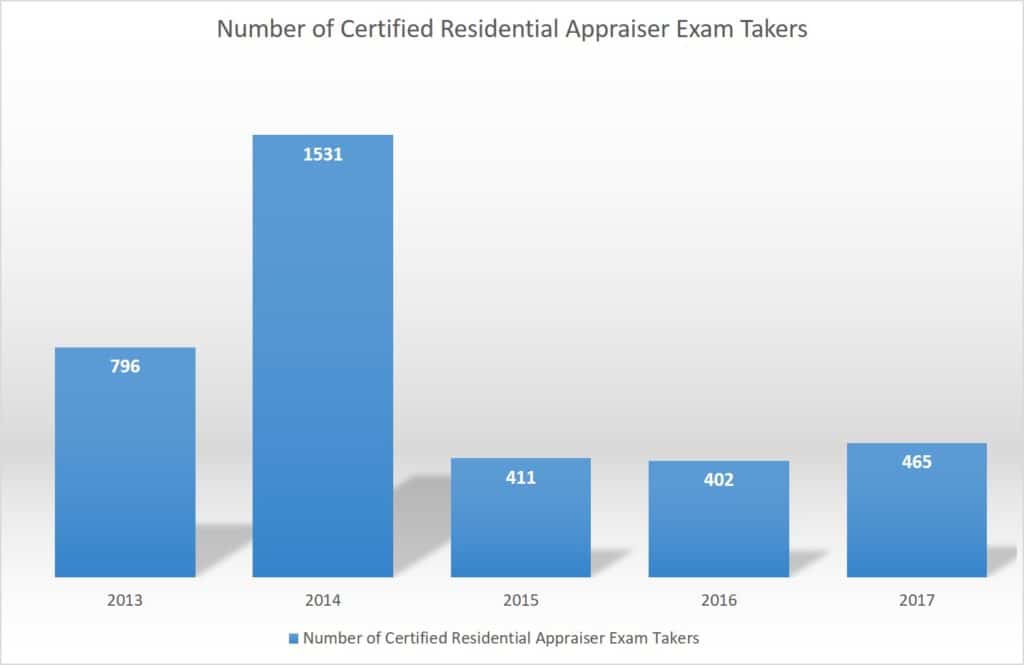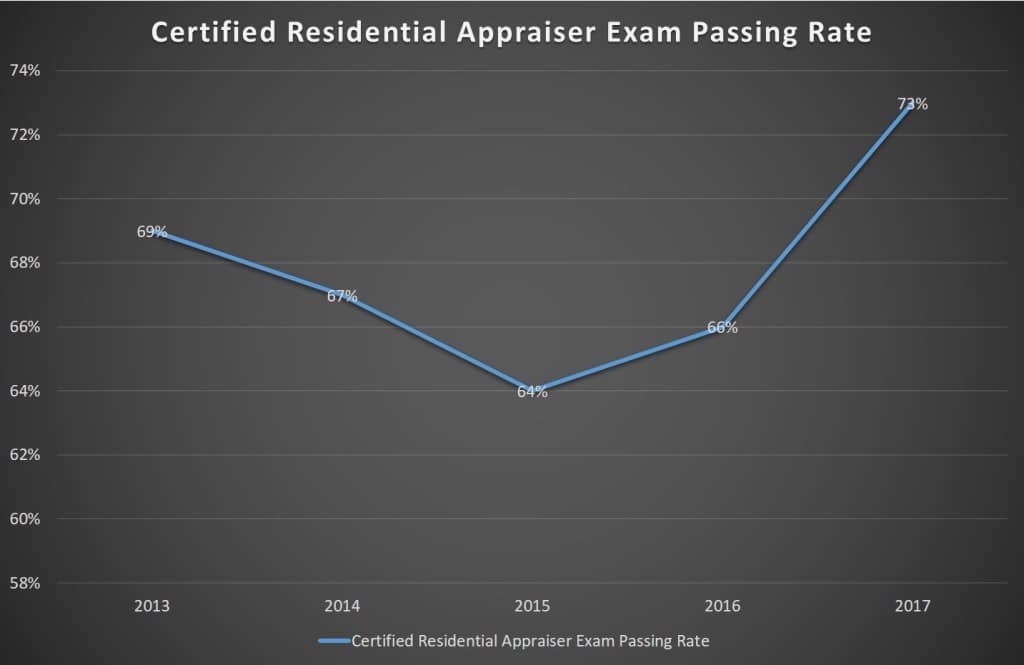(**) Disclosure: This post may contain affiliate links, meaning RealEstateCareerHQ.com will get a commission if you decide to make a purchase through the links, but at no additional cost to you.
A Certified Residential Appraiser can legally appraise residential properties with 1 to 4 units without restricting the transaction value or complexity. The CR license also allows appraisers to appraise non-residential 1-4 units property given that the transaction value is no more than $250,000.
Certified Residential Appraiser is the next licensing level beyond the Licensed Residential Appraiser. Many reputable lenders and financial institutions prefer real estate assessments done by a Certified Appraiser.
Due to this added recognition and broader scope of work, many people decide to obtain this appraiser title. In fact, more than half of real estate appraisers are Certified Residential Appraisers.
To upgrade your license to the Certified Residential Appraiser, you need to fulfill the extra hours of qualifying education, appraisal work experience, pass the exam, and meet the college-level education requirement. However, in some states, you no longer need to become a Licensed Residential Appraiser before getting Certified.
In this article, you will find steps in becoming a Certified Residential Appraiser, income figures, and exam details. I’ll also show you sample jobs of a Certified Residential Appraiser and other helpful ideas about this profession.
The first step to begin in this career is to complete the appraisal education requirement. McKissock has years of experience in providing high-quality appraisal courses. Here’s the link to their online classes. (**)
A Video Summary on Being a Certified Residential Appraiser
What can a Certified Residential Appraiser do?
Similar to being a Licensed Residential Appraiser, you could be employed by appraisal firms, financial companies or government departments. Depending on the employment contract, you could be offered with a stable salary, medical insurance coverage and other perks such as reimbursement of a license fee, continuing education tuition and E&O insurance premium.
If you desire a greater flexibility in your appraisal practice, you could also start your own business in providing appraisal services to your clients.
So what kind of jobs are available for a Certified Residential Appraiser?

I just saw a job posting which might give you a better understanding. This was from an appraisal firm in North Carolina. Their focus was to provide appraisals for:
- First or Second Mortgages
- Mortgage Refinancing
- Private Mortgage Insurance Removal
- Estate Sales
- Divorce Settlement
- Employee Relocation
They were looking to hire a residential appraiser, where you would need to be certified in both North Carolina and South Caroline.
They offered a fee-splitting model which based on your qualifications and experience.
This company would cover license renewal fees and MLS dues. You would be provided with office working space, administrative support, ACI software, and in-office supplies.
Here’s a Snippet of What Jamie Owen Thinks About Being a Real Estate Appraiser!

“The more you learn, the more you will enjoy being an appraiser.”
“I think that humility and honesty are the most important attributes. Humility is important because if we think we know it all, we are going to be in trouble. Being appraiser requires not being thin-skinned and defensive. Others have their opinions and we have ours. Both may be supportable in one way or another.
Being humble helps us to respect the views of others and not be offended if others have a different view. Humility also helps with business relationships, as well as accepting guidance and reminders when we need them, from peers and others.”
– Jamie Owen, Certified Residential Real Estate Appraiser at Aspen Appraisal Services
Here’s an exclusive interview with Jamie. He shared with us his journey and valuable experience in the appraisal industry. You’ll also learn what it is like to be a real estate appraiser nowadays.
5 Steps to Become a Certified Residential Appraiser

To become a Certified Residential Appraiser, you must:
- Finish the required qualifying courses
- Complete the required hours of appraisal work
- Register with the appraisal board in your state
- Pass the National Uniform Licensing and Certification Examination.
As of May 1st, 2018, the Appraiser Qualifications Board reduced the requirement to obtain the Certified Residential Appraiser license. (Here are the changes for your reference.)
Below are the minimum requirement set out by the Appraiser Qualifications Board (AQB). But every state could add-on more requirement for their real estate appraisers.
Let’s go through the steps to become a Certified Residential Appraiser.
Step 1: Meet the eligibility requirement

- At least 18 years old
- Have a valid Social Security Number
- Fulfill one of the following six college-level education requirements
- Bachelor’s Degree or higher
- Associates Degree related to Accounting, Business Administration, Economics, Finance or Real Estate
- Complete 30 semester hours of college-level courses that cover each of the following subject and hours:
- Algebra, Geometry, or Higher Math (3 hours)
- Business Law or Real Estate Law(3 hours)
- Computer Science (3 hours)
- English Composition (3 hours)
- Finance (3 hours)
- Macroeconomics(3 hours)
- Microeconomics (3 hours)
- Statistics (3 hours)
- Two elective courses in any of the above topics, or in Accounting, Agricultural Economics, Business Management, Geography, or Real Estate (3 hours each)
- Complete at least 30 semester hours of College Level Examination Program®(CLEP®) examinations
- Any combination of Option #3 and Option #4 that includes all of the topics listed in Option #3
- The college-level education requirement can be waived if you have been a licensed residential appraiser for at least 5 years, while your license has been remaining in good standing.
Step 2: Complete the appraisal education

Complete 200 hours of appraisal courses from an approved education provider. You should have taken some of them when you were becoming a trainee or a licensed residential appraiser. Therefore, you just need to make up for the extra courses.
Here are the courses that you need to take.
- National USPAP Course or Equivalent (15 hours)
- Basic Appraisal Principles (30 hours)
- Basic Appraisal Procedures (30 hours)
- Residential Market Analysis and Highest & Best Use (15 hours)
- Residential Appraisal Site Valuation and Cost Approach (15 hours)
- Residential Sales Comparison and Income Approaches (30 hours)
- Residential Report Writing and Case Studies (15 hours)
- Statistics, Modeling and Finance (15 hours)
- Advanced Residential Applications and Case Studies (15 hours)
- Appraisal Subject Matter Electives (20 hours)
Study tip: Whenever possible, I prefer to take online courses. You can study at your own pace at the convenient of your home, library, or wherever there is internet access. Here’s an article review of an online school that I like.
The Real Estate Appraisal Board in most states permit you to take these courses online. However, there are a few exceptional ones that impose their own restriction when it comes to distance education.
So make sure to confirm with the education provider or the Appraisal Board in your state before enrolling to a course.
Step 3: Fulfill the appraisal work experience

The AQB minimum requirement is to complete 1,500 hours in no fewer than 12 months.
Some states do impose additional hours of work requirement. For example, Delaware, Nebraska, North Dakota, Montana, West Virginia all require their applicants to have at least 2500 hours of appraisal work experience.
Furthermore, there should be restrictions on the number of hours the Appraisal Board could recognize for a particular category of appraisal activity.
For instance, it is not reasonable to have all the 1500 hours allocated toward handling paperwork, while you have never gone to inspect any property in person.
So make sure you understand what is required in the experience log.
Step 4: Register with the Real Estate Appraiser Board

Each state has its own regulatory agency that is responsible for issuing appraiser licenses. Once you complete all the requirement, your next step is to submit the Certified Residential Appraiser Application to the Board.
Most of them would require you to provide:
- Evidence for the completion of the qualifying appraisal courses (i.e.: Official Transcript)
- Experience logs
- Application fee
- Legal documents (i.e.: fingerprints to conduct a background check)
Many Appraiser Boards have websites where you could apply online. This is a lot quicker and more convenient. For those that have not upgraded their online system, you need to post the documents to them.
Step 5: Pass the Certified Residential Appraisers Exam

After the Board approve of your application, they will send you instructions to register in writing for the exam. An approved testing company will administer the exam. They usually are PSI, Pearson-Vue or AMP.
There will be an exam fee. It typically costs around $100 to $200.
Each state would have an Exam Candidate Handbook with more information specific to the test in its state. You could follow this link to find out the state licensing requirement.
Here is the Appraiser Examination Candidate Handbook for your reference.
Here is more info on the Certified Residential Appraiser Exam

Source: The Appraisal Foundation
The Certified Residential Appraiser Exam is a 6 hours exam, which consists of 125 questions. Only 110 questions will be counted, the other 15 are just pretest questions.
The required passing score is 75. Since this will be a computerized exam, you will immediately know the result once you complete the test.

Source: The Appraisal Foundation
The passing rate hasn’t changed much over the years. It has been in the range of mid 60% to low 70%. However, I did see a gradual improvement since 2015.
Similar to the situation of the Licensed Residential Appraiser exam, there had been a spike to the number of the exam writers in 2013 and 2014. I believe that should be due to the stringent rules change in 2015, so more people decided to write the test before it.
Rather than going through everything in the textbook without a clue what will be tested. It is important to focus on subjects that are most likely going to be tested. Here are some tips to help you increase your appraiser exam passing rate.
Is it a Wise Choice to Become a Certified Residential Appraiser?
If you are planning to build your career in the real estate appraisal industry for the long haul, then there is really no reason not to pursue being certified.
This is especially true if you already are a Licensed Residential Appraiser. You just need to complete an additional 50 hours of qualifying coursework and write the exam. In terms of the required hours of work experience, as long as you are continually working in this field, you will eventually accumulate them anyway.
Some appraisers might have a concern about the college-level education requirement. The six options available now really makes it more flexible for a licensed appraiser to upgrade their license.
How Much do Certified Residential Appraisers Make?

According to the figures on Salary.com (Oct 28, 2020),
- the average salary for residential real estate appraiser with two to four years of experience is $54,959
- the average salary for residential real estate appraiser with four to seven years of experience is $74,601
Although it does not specify whether the numbers are for licensed/certified residential appraiser, it is safe to assume a majority of them are holding the certified residential appraiser license.
The reason is when you look at the figures from the Appraisal Institute U.S Valuation Profession Fact Sheet, as of 2018, 50.7% of appraisers are holding Certified Residential Appraiser License, while only 7.9% are Licensed Residential.
If you want to further expand your scope of work, then your next step would be to obtain the Certified General Appraiser license. Here’s a post on the CG Appraiser license.
I hope you found this post helpful. If you do like it, please remember to share it.
(**) Affiliate Disclosure: Please note that some of the links above are affiliate links, and at no additional cost to you. Our company, JCHQ Publishing will earn a commission if you decide to make a purchase after clicking on the link. Please understand that we include them based on our experience or the research on these companies or products, and we recommend them because they are helpful and useful, not because of the small commissions we make if you decide to buy something through the links. Please do not spend any money on these products unless you feel you need them or that they will help you achieve your goals.
Disclaimer: The information in this post is for general information only, and not intend to provide any advice. They are subjected to change without any notice, and not guaranteed to be error-free. For full and exact details, please contact the Real Estate Appraisal Board in your state.
Reference:

